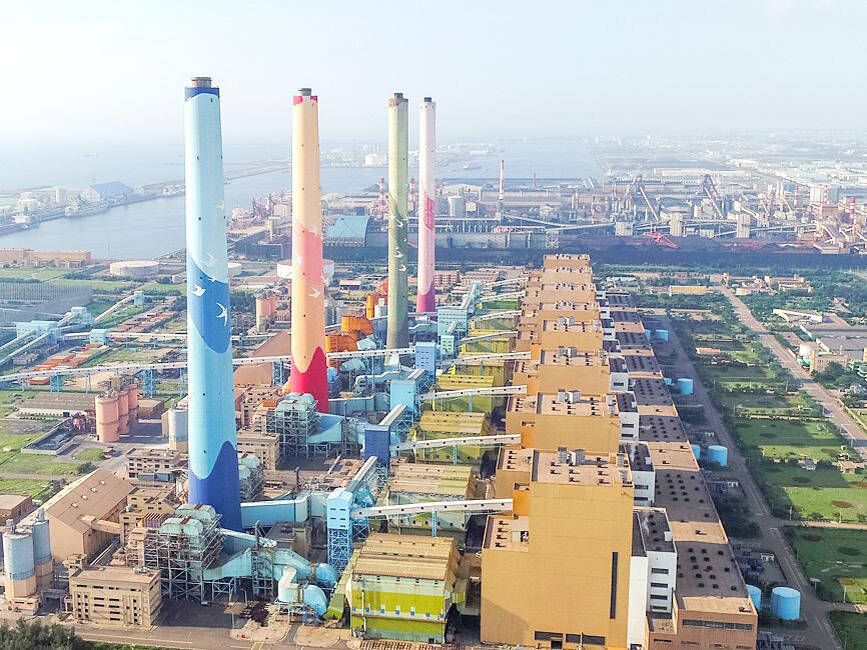The Taichung Power Plant would phase out its coal-fired power generation facilities by the end of 2034, one year ahead of schedule, transitioning to natural gas to reduce Taiwan’s main source of air pollution, Premier Cho Jung-tai (卓榮泰) said on Friday.
To achieve this goal, state-run Taiwan Power Co (Taipower, 台電), which operates the country’s largest coal-fired power plant, would be required to expedite gas facility construction, Cho said during an inspection of the plant.
Cho visited the plant amid ongoing debates over a recently completed environmental impact assessment that approved the second phase of the plant’s new gas-fired generators installation plan.

Photo courtesy of the Taichung City Government
Under the government’s two gas-fired units installation plans, four of the nation’s 10 existing coal-fired units would be dismantled, while the remaining six would be decommissioned and kept offline unless needed in cases of emergency.
Cho said that the plant would generate power without the use of coal by the end of 2034.
After that, the six coal-fired reserve generators would only be activated in cases of national security or natural disasters, he said.
Local governments would be notified when the units are to be activated, and coal usage would be kept to less than 1 percent of current levels, Cho added.
In 2032, the government would evaluate whether the six emergency coal-fired units would still be needed, he said.
The Taichung Power Plant would have eight coal-fired units and two natural gas-fired power generators by the end of 2028, Taipower said.
Afterward, the plant would dismantle its two coal-fired units, gradually decommission the remaining ones while keeping them on standby, and introduce four new gas-fired generators, it said.
Although the government has said that the transition would reduce air pollution by 88 percent, opposition lawmakers questioned why the decommissioned units are being retained.

Alain Robert, known as the "French Spider-Man," praised Alex Honnold as exceptionally well-prepared after the US climber completed a free solo ascent of Taipei 101 yesterday. Robert said Honnold's ascent of the 508m-tall skyscraper in just more than one-and-a-half hours without using safety ropes or equipment was a remarkable achievement. "This is my life," he said in an interview conducted in French, adding that he liked the feeling of being "on the edge of danger." The 63-year-old Frenchman climbed Taipei 101 using ropes in December 2004, taking about four hours to reach the top. On a one-to-10 scale of difficulty, Robert said Taipei 101

Nipah virus infection is to be officially listed as a category 5 notifiable infectious disease in Taiwan in March, while clinical treatment guidelines are being formulated, the Centers for Disease Control (CDC) said yesterday. With Nipah infections being reported in other countries and considering its relatively high fatality rate, the centers on Jan. 16 announced that it would be listed as a notifiable infectious disease to bolster the nation’s systematic early warning system and increase public awareness, the CDC said. Bangladesh reported four fatal cases last year in separate districts, with three linked to raw date palm sap consumption, CDC Epidemic Intelligence

Taiwanese and US defense groups are collaborating to introduce deployable, semi-autonomous manufacturing systems for drones and components in a boost to the nation’s supply chain resilience. Taiwan’s G-Tech Optroelectronics Corp subsidiary GTOC and the US’ Aerkomm Inc on Friday announced an agreement with fellow US-based Firestorm Lab to adopt the latter’s xCell, a technology featuring 3D printers fitted in 6.1m container units. The systems enable aerial platforms and parts to be produced in high volumes from dispersed nodes capable of rapid redeployment, to minimize the risk of enemy strikes and to meet field requirements, they said. Firestorm chief technology officer Ian Muceus said

MORE FALL: An investigation into one of Xi’s key cronies, part of a broader ‘anti-corruption’ drive, indicates that he might have a deep distrust in the military, an expert said China’s latest military purge underscores systemic risks in its shift from collective leadership to sole rule under Chinese President Xi Jinping (習近平), and could disrupt its chain of command and military capabilities, a national security official said yesterday. If decisionmaking within the Chinese Communist Party has become “irrational” under one-man rule, the Taiwan Strait and the regional situation must be approached with extreme caution, given unforeseen risks, they added. The anonymous official made the remarks as China’s Central Military Commission Vice Chairman Zhang Youxia (張又俠) and Joint Staff Department Chief of Staff Liu Zhenli (劉振立) were reportedly being investigated for suspected “serious